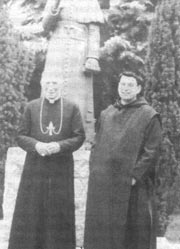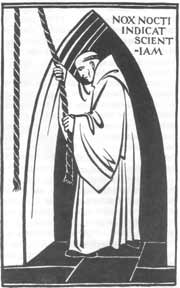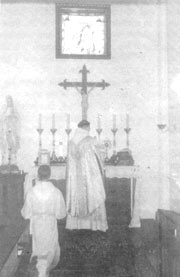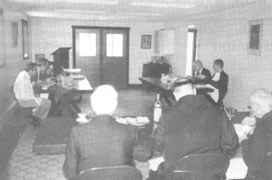Maryvale Benedictine Monastery
Fr. Cyprian, O.S.B.
Born in a context of crisis, sisterhouse of Santa Cruz monastery in Brazil, Maryvale Benedictine Monastery humbly opened its door on the feast of the Epiphany, January 6 of this year. This feast day providentially determined the spiritual program for the little American Benedictine foundation: The spirit of adoration, the true homage due to Christ the King, and a consecrated life of intercession and reparation for souls who refuse to be subject to the reign of the Prince of Peace.
After having met with Archbishop Lefebvre at Ecône last November, Fr. Cyprian parted for Rome with Fr. Thomas Aquinas, the superior of Santa Cruz monastery in Nova Friburgo, Brazil. With the mission of founding a sister monastery of the Brazilian foundation, the two Benedictine Fathers traveled to the grotto of St. Benedict at Subiaco just east of Rome, to confide the two foundations to the Patriarch of monasticism.
 His Grace, Archbishop Lefebvre, and Fr. Cyprian at Ecône. |
Having departed from Ecône with the Archbishop's full blessing and heartfelt encouragement, after a day spent in prayer with Fr. Thomas Aquinas at St Benedict's grotto, Fr. Cyprian returned home to America to open the doors of Maryvale monastery.
"We decided to choose The Immaculate Heart of Mary as patron of the new monastery, and since a secondary patron saint is allowed as well, we chose Saint Joseph, patron and model of the hidden interior life," Fr. Cyprian told The Angelus. "With Our Blessed Mother's protection there will surely be no risk involved or any danger too great for this somewhat audacious enterprise. Saint Joseph, while being the head of the Holy Family, was also the first monk who quietly contemplated Our Lord, what better model could we find to imitate?"
"The blessing of Archbishop Lefebvre is for us the sign we sought from God to proceed with the foundation," Fr. Cyprian went on to say. "After having returned to France for the Archbishop's astounding jubilee celebration in Paris on November 19, Fr. Thomas and I drove to Ecône to discuss the project of founding a monastery in the U.S. Our meeting with the Archbishop was overwhelming."
Fr. Cyprian told us of his reluctance to launch himself headfirst into the founding of a brand new monastery, when, in fact, he was actually thinking of hanging up the Benedictine habit for good in exchange for the society cassock. "I just wanted to give up the monastic life and join the Society of St. Pius X. Besides, I owe the society my vocation and my priesthood, and it might have been the easier solution to my situation," Father told The Angelus. But the meeting with Archbishop Lefebvre would shed a new light on the subject. "I listened with tears in my eyes while the Archbishop reminded me that, for the good of our beloved Church, more monasteries must be founded. He said the Church will never recover from this present crisis without monasteries, without the contemplative life, and without the example of monks and nuns who consecrate their lives entirely to prayer and intercession."
 |
"The Archbishop went on talking for 45 minutes about the monastic life and its extremely crucial importance while I could only listen," Fr. Cyprian said. "When I left his room I was a bit dumbfounded, and had in my trembling hand a little card bearing the words of the Archbishop's blessing and, in my heart, the mission to found a monastery. I wasn't exactly relaxed."
"Fr. Thomas and I met to discuss our next move, and unanimously decided to travel to Subiaco to confide the monastery to St. Benedict himself. After a day of prayer and recollection in the grotto we parted. Fr. Thomas left Rome to return to Santa Cruz in Brazil, and I began making my way home to the US."
When he returned to Detroit where he had just spent a year as chaplain of the Society of St. Pius X Sisters, Father bid farewell to the parishioners and the Sisters. He set out for Kentucky where an empty retreat house built by the Pfeiffer family was waiting 'gratis Deo'. "Fr. Pfeiffer told me about the place while I was visiting Ecône, saying that it was just sitting there on his father's farm waiting for someone to come along and put it to use. I went to have a look and decided it would be an ideal place to begin."
Angelus readers may recall the interview with Fr. Cyprian which appeared in the September 1989 issue. A detailed explanation was given of the crisis which led to the departure of several monks from the French Benedictine monastery at Le Barroux after the episcopal consecrations. Now, however, far from the polemical controversies and heated disputing which characterize all those who have abandoned Archbishop Lefebvre, the dispersed monks quietly and peacefully continue. A new monastery has been opened in central France, the monastery in Brazil, Santa Cruz, continues to flourish with the help of the priests of Bishop Castro Mayer in Campos, and now, Maryvale monastery in Boston, Kentucky brings the same traditional Benedictine monastic life to America. The way of life found at Maryvale monastery is the same practice of the Rule of St. Benedict which singles out the Congregation for Subiaco known as the Primitive Observance, otherwise unknown to the United States. Most American congregations of Benedictines were known in the past for their active apostolate, schools and seminaries. "Only one foundation of our congregation was ever made in this country, it was Weston Priory in Vermont, now famous for its charismatic square dance liturgies and things beyond description," Father said. "The cloistered contemplative Benedictine monks who have no exterior ministry are relatively foreign to America. The closest thing to us would be the Trappist monks as they lived the Rule before the Council," Father added.
 Mass in the Chapel. |
Some of the characteristics of the monks of Maryvale are the traditional monastic tonsure in the form of a crown on the head, the continuous wearing of the black monastic habit, perpetual abstinence, the use of the medieval sign language to safeguard the contemplative silence, strict enclosure, all the hours of the Divine Office are in Latin and Gregorian Chant, with the exclusive use of the traditional Mass.
"A few visitors shopping around for monasteries have come and gone, and for one, the silence and solitude were too spooky, for another the discipline was too military. I mentioned to him that monks and Marines are first cousins..." Father said that the life is very challenging and demanding, the difficulties are rather of a spiritual nature. "The period of foundation is a time full of little crosses to bear and usually rough on the first monks, but the merits abound and are precious to the Church and most pleasing to God." Father mentioned. "The deep faith which drove St. Benedict out of the godless Law School in Rome, that same deep faith which lured him to a monastic grotto in the mountains to be alone with God, that is the faith which characterizes a son of St. Benedict," Father explained. Faith is not of equal urgency for everyone. Some take their faith to heart, others take their faith for granted. The first aptitude of a candidate to the monastic life is a lively faith, solidly founded on the rock of tradition. We do not blush to align ourselves with Archbishop Lefebvre precisely for that reason. His approach to the present crisis of faith is crystal clear and purely Catholic throughout. This is the kind of solicitude regarding the faith our candidates must have if they wish to persevere. The absence of vocations in monasteries and convents around the world is due to the crisis in the Faith. The instinct of faith is under attack and unless it is restored there will be no more vocations anywhere. A contemplative religious who has little or no contact with the other Orders of cloistered nuns, like the Benedictines of our observance, or the Trappist and Carthusian monks, the list is long but their monasteries are all virtually empty. Contemplative religious must have an exceptionally deep sense of the faith and unless they have recourse to the sanctifying grace conferred by authentic sacraments, their faith will starve, and their instinct of faith will lose its sharpness and lead to spiritual desolation and frustration, the spirit of faith will be substituted by the spirit of the world, and through obsessions and ambush attacks, the devil will tempt the religious who has been thus disarmed, causing him to abandon the cloister and eventually the practice of the Faith. It is easy to see the fruits of the make-believe reforms of Vatican II. It doesn't require a genius to see how the Council destroyed the Religious Life. But thanks to one bishop, there are Carmels, there are Benedictine monasteries, and other houses of contemplative religious who are helping to restore the Church precisely where she is most under attack."
 The noon meal in the refectory. |
Father mentioned some other aptitudes of candidates to the monastic life, "A sincere desire to be formed by the traditions of the ancient monks, and while some think the apparent primacy of Latin is an obstacle for Americans, I think not, since all the hours of the Divine Office are sung in Latin and Gregorian Chant, the Latin is learned more or less by osmosis and is perhaps less abstract and arduous for students. They pick it up more or less naturally in a monastery, though at first it is certainly somewhat overwhelming, like the culture shock of being in a foreign country."
"Some people have the idea that quiet, introverted people would surely make good monks since neither of the two talk. Yet excessively quiet, introverted souls are usually somewhat stubborn and obstinate, the more difficult to form as obedient religious docile to the rule. Actually, expansive, outgoing and high-spirited people make the best contemplatives, since it is easier to learn to listen than to learn to speak. There is no mutism or escape from reality in a monastery. Social rejects or romantic Robinson Crusoes have never made good monks. The discipline requires a vigorous and generous soul."
"Enemies of the monastic life have always doubted its usefulness, accusing monks and nuns of evading the pressures of real life, fleeing responsibility and hiding in the cloister, lounging around day-dreaming and philosophizing all day long. But a single day spent in a monastery would suffice to correct this prejudice. A contemplative religious thrusts himself into the presence of God and never returns. If a contemplative is not obsessed by the presence of God, if he is not constantly preoccupied by the pressing need to glorify God through all his actions however great or small, then, yes, he would indeed be escaping reality, since there is no other reality more real than the glory of God. Just as St. Thomas reminds us that the glory of God is the end and purpose of all creation, so is that same glory of God the unique reason why a monastery exists in the first place."
Father summed up his explanation of the Benedictine life by saying that, the monastic life is, in essence, nothing more than the true Catholic life lived in its fullest and highest degree. "As St. Therese said, it is the extraordinary life of the ordinary." The motto of the Benedictines is 'Ut in omnibus glorificetur Deus': That in all things God may be glorified. That is our ideal. In that little phrase taken from the Rule of St. Benedict is found the entire monastic ideal.
Young men between the ages of 21 and 35 interested in the monastic life such as it is lived at Maryvale monastery may write: Maryvale Monastery 1730 North Stillwell Rd Boston, Kentucky 40107
Faithful who would like to help the monastery may send their offering to the same address, making their check to the order of "Maryvale Monastery". May God bless your generosity in advance.
